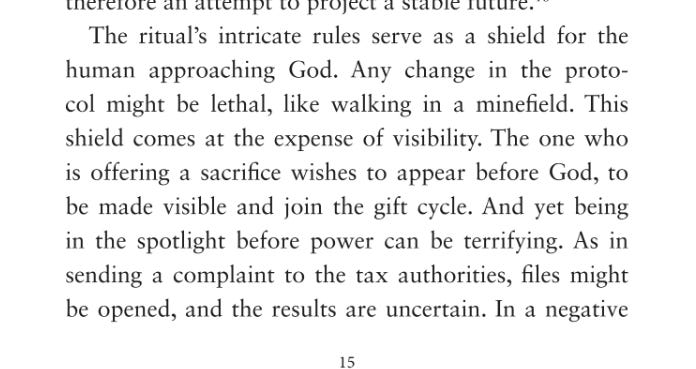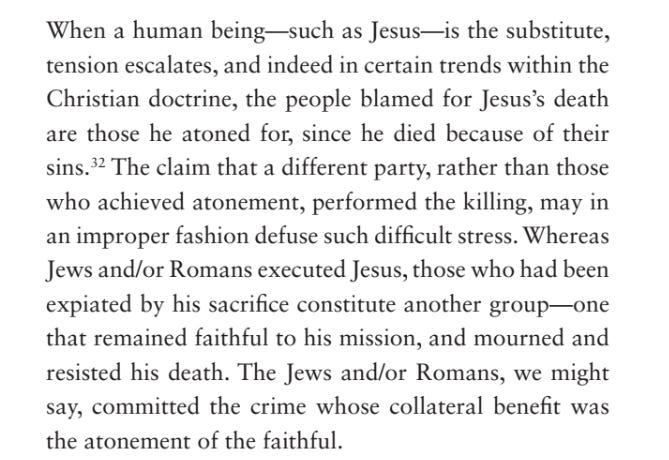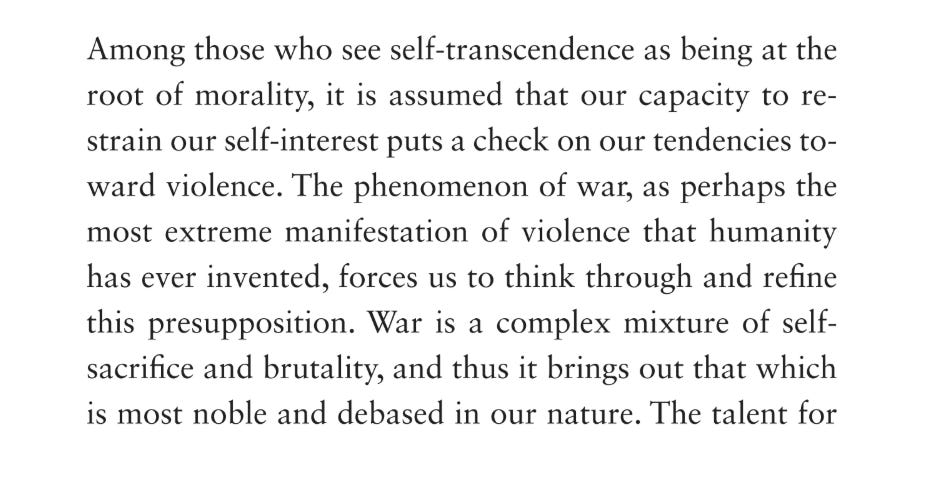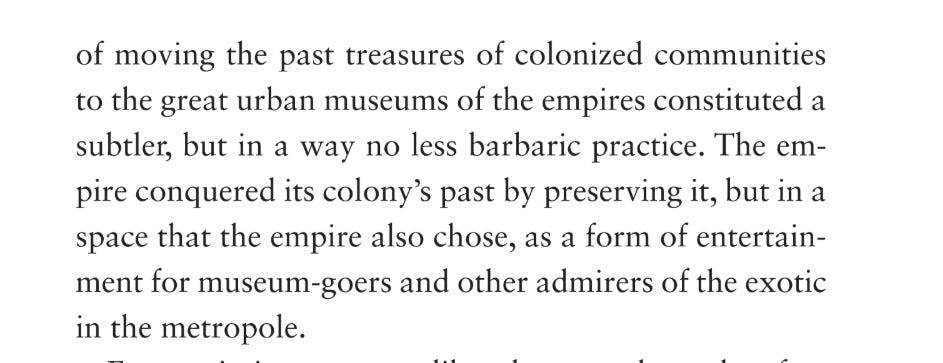Notes on Books I've Read: "On Sacrifice" by Moshe Halbertal
I figure let's keep doing this until I develop something that works
Moshe Halbertal’s “On Sacrifice” is a great winter shabbos afternoon read. 147 pages and essentially a devar torah1, I remember it having some interesting insights but also making some frustrating turns.
Let’s dive in.
So the way Halbertal analyzes the laws of sacrifices (and part of his argument will be that its a bad translation to call it that) is that its properly understood as a gift, with all the anthropological significance thereof.
page 11
So the way gift giving works in human societies is that you enter into a cycle of receiving and reciprocating, at least between equals. But when giving a gift to a superior, its a sign of submission, of thanks for all that has been provided for you, rather than something that can be repaid. Halbertal extends this to say that when it comes to God, you’re actually returning stuff that came from God. It’s not just a gift, it’s a returning.
I have a bunch of this next bit underlined (I guess I started it before shabbos?).
Page 12-13
He points out the difference between vows made by Yaakov and Chana is that Yaakov only gives a tithe from what he gains in the interim whereas Chana actually gives the child she asks for to god, thus returning/recycling the gift and establishing a “gift cycle”.
So the way Halbertal conceptualizes sacrifices/offerings (his preferred term), is as something you return to God in order to express one’s gratitude to God and recognition that it all comes from God. Crucially, and unlike what edgy atheists might tell you, this isn’t a bribe, because that ignores the difference in hierarchy between the giver and receiver. “A middle class person cannot bribe a billionare”, because the billionare doesn’t need the money. Sacrifice is not about God’s needs, its about our recognition, gratitude, and desire to enter into a relationship with God.
Now look at those italics. Always important when someone puts a whole paragraph in italics. Because Halbertal points out that because of the impossibility of God returning the gift, the only way for the gift exchange to “fail” is for the gift to be rejected.
The idea that the biggest fear in sacrificial service is of the gift being rejected makes a lot of things make sense, as he will explain. But yes, Kayin and Hevel! But hold on.
Page 15
The purpose of ritual around gift-giving, in any form including animal offerings, is to mitigate risk of rejection. The purpose of all of Vayikra, regulating the exact types of offerings and who brings it and how and with what are fundamentally in response to the possibility of rejection that is portrayed in Bereishit with Kayin and Hevel. Very cool to me that that story is presented as so fundamental to humanity in a way that we might have missed lacking a temple service.
But, ritual comes at a price, of erasing one’s individuality.
This is a cool way to approach Iyov, that it’s his conspicuousness that “opens the mouth of Satan so to speak” But anyway
Ritual is safe, but erases individuality, and those who wish to be intimate with God sometimes push the boundaries in an attempt to be recognized by God as individuals. Obviously Nadav and Avihu serve as an example of wrongfully assumed intimacy.
So he’s developing this very interesting scheme of how ritual interplays with offerings interplaying with human desire to be close to God: Humans want to establish a relationship with God, but its scary because they might be rejected, hence they evolve rituals, which some seek to go beyond in an attempt to have a relationship with God that recognizes them as individuals, sometimes with bad effects.
What I like about this book is that excavates a mindset that is somewhat foreign to us. Why would you see bringing an animal to God as a form of religious worship? How would you view the rules about it? He’s trying to get into that headspace.
Halbertal continues talking about Nadav and Avihu. page 17-18
He points out that the deaths of Nadav and Avihu come right after the institution of all the ritual and regulations surrounding the cult, such that Nadav and Avihu can be presumed to be rebelling against that specifically. We don’t want our worship to be regulated by boundaries and protocols, say Nadav and Avihu, we want intimacy and immediacy, and they’re killed. Crucially, Halbertal points out that that means that the primary danger concieved of by Sefer Vayikra is not rejection; the following of the protocols ensures that the people’s offerings will not be rejected. Rather its presuming a false intimacy and breaching the boundaries.
Then he says a sentence which is pretty interesting beyond just the biblical text, which is why I have it underlined.
I think this is an interesting way to think about a lot of things in life, that we use ritual as a way to grapple with unpredictability, particularly with rejection. Are norms of say, hygiene, about cleanliness only, or are rituals to grapple with the possibility of being rejected by peers and potential romantic partners? Okay, maybe not hygiene, but I think of how scared I was as a teenager to date for fear of rejection, and all the things I would do to try and ensure not being rejected in terms of what personality I portrayed or, in my case, avoiding getting close to anyone at all. There’s a deep vein to be mined in this one sentence.
There’s also some implications for talking about incels, which leads me to the next thing I have flagged, page 19-20.
Halbertal reads the Kayin and Hevel story as talking about what happens to someone who has been rejected, ie, their gift has not been accepted. It leads to violence, in Kayin killing Hevel This turns our understanding of human nature around a little bit. We assume that people get upset when they don’t get something, but what Halbertal is pointing out is that being excluded from giving is even more upsetting and alienating. People have an inherent need to give and for their giving to be accepted, and fear of rejection is a fear of that being unfulfilled. This is an interesting view of human nature that’s maybe at the root of more things than we’d expect.
Page 23
This is a really interesting theological observation, that love of God is complicated by the power asymmetry between us and God, that I don’t think I’ve seen anyone else address. Halbertal goes on to see this as the root of what’s going on in Iyov. Satan says “Maybe Iyov only loves you, God, because you’ve provided all this stuff for him”. That said, I don’t think making Iyov’s life miserable instead exactly solves the problem of power asymmetry, and the end of the book might even be a re-asserting of it. Tzarich iyun.
Halbertal then pivots to talking about what kind of gift might be given to God that cannot be part of an exchange. Its akedah time, baby. Page 24
In Halbertal’s understanding, God demands of Avraham that he give him the one thing he can’t replace, a son, in order to show that this relationship is not about the stuff Avraham gets, but about the relationship. But by renouncing his desire, (not rejecting it), God accepts that Avraham was willing to do so but accepts a substitute instead as a symbol of a gift that cannot be replaced.
There’s an interesting paradox here, of something that cannot be replaced being demanded and then being replaced in order to symbolize a gift that cannot be replaced. But I’m honestly not sure I follow Halbertal all the way here.
apparently i didn’t find the next 9 pages interesting so we skip to page 33
OK, interesting idea here to explain the need for an unblemished animal. The animal must be innocent in order for it to have sins projected onto it. This is gonna matter for the next bit I have flagged, talking about Christianity. Halbertal has this idea that the idea that “korban” means “sacrifice” (rather than offering) only comes around when Christianity does.
Basically, because the act of offering involved killing an innocent, there’s an inherent tension because in order to atone for a sin, you’re doing one, and when that is, instead of an animal, a human being, and possibly a god, that problem becomes even more intense. So you need to develop a theology in which the people who gain atonement for the sacrifice and the people who did the sacrifice are different sets of people, which eventually meant blaming the Jews for Jesus’s death. And yes, within the Western tradition we very much act as scapegoats, not just for Jesus’s death but for anything that Western society does it would prefer to blame on others. Look around and what’s happening today, where Jews become a convenient scapegoat for the horrors of colonialism and nationalism. Christianity often proposes a worldview in which a Jewish man died for humanity’s sins and Jews should continue to do so.
Halbertal then talks about the ways Jews dealt with the end of sacrifices, by replacing it with other things, including charity, as in this midrash he quotes.
Same stuff that Halbertal’s been talking about in terms of the anxiety of gift giving to a superior and the fear of rejection, but in this midrash its replaced by charity. Cool stuff if you ask me.
One thing I don’t see Halbertal noting is the role hierarchy plays in this midrash. The reason why you’re afraid of rejection for the king is because of his higher rank, which is not a fear with a poor person who is below you. Feels like there’s more there.
page 47, in the context of talking about repentance as replacement for sacrifice.
Honestly not sure why I flagged this? Maybe for my Vayikra project for the “salt” piece.
Next, martyrdom:
Compare to The Name of the Rose, Umberto Eco, page 254
I’m kind of obsessed with that book. Sorry, moving on.
The next section of Halbertal’s book, after this one that was “sacrificing to”, is “sacrificing for” and kind of undercuts the point he made in the first section about how offerings aren’t sacrifices, because he goes “well I want to talk about sacrifice anyway”. Ok, whatever, it had to be book length I guess. That said, I still have some stuff flagged so apparently it was worth it.
Page 64-65
So yeah, while he’s veered off from talking about Tanach, he makes an interesting point that while people see the ability to transcend one’s own desires and priorities as the root of morality, it is also the engine that makes war run. And he’s getting at something deep here, that war is both an expression of and suspension of our moral sensibilities, as he says, something that brings out humanity at its most noble and most debased.
Skipping like 30 pages, which I hope aren’t important, to page 97.
Interesting reflection on and twist of the human need to be remembered, to rise above the normal functioning of the world and be remembered as individuals within it. We might connect this back to the tension he notices between ritual and individual expression. No one remembers people who followed the rules and did what God commanded. We do remember Nadav and Avihu. Also interesting way of understanding what the British Museum (among others) is, destroying a past by removing it from its context and situating it as a form of amusement or interest. I think there’s more to say here about how even academic description of a culture does the same thing because the lens that its being described is one that it is outside of it. Even the most enlightened western academics are still describing something on western terms for western audiences.
Keep reading with a 7-day free trial
Subscribe to Secondary Elite: A Misfit Torah Newsletter to keep reading this post and get 7 days of free access to the full post archives.





























